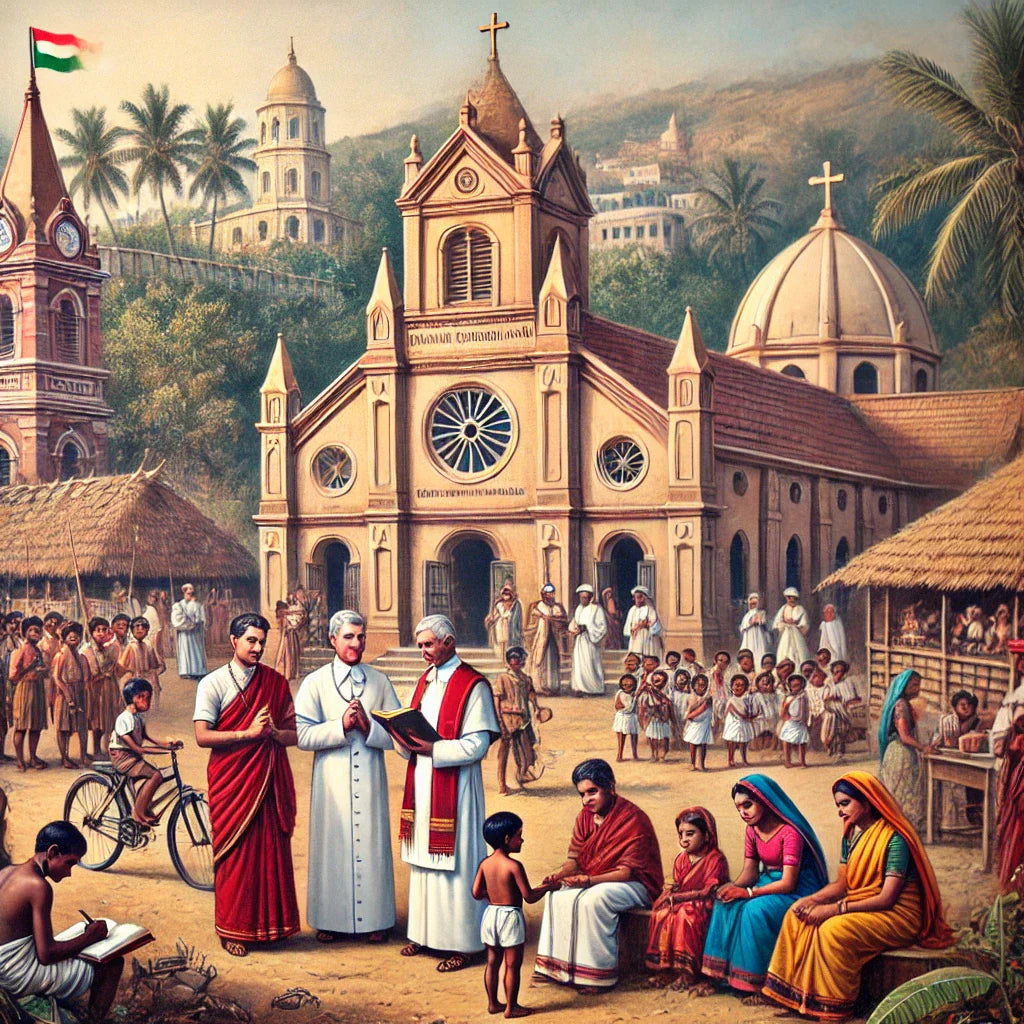
French and British Contributions to Indian Catholicism
|
|
Time to read 4 min
|
|
Time to read 4 min
Indian Catholicism, with its deep roots and vibrant traditions, has been significantly influenced by the missionary efforts of the French and British during the colonial period. Tamil Nadu and Bengal, in particular, witnessed transformative contributions that continue to shape the social and religious fabric of the region. This blog explores the roles played by French and British missionaries in Indian Catholicism, emphasizing their establishment of schools, seminaries, and social services.
The spread of Catholicism in India began long before the arrival of French and British missionaries, with Portuguese efforts dominating the early phase. However, by the 17th and 18th centuries, French and British missionaries brought their unique approaches to evangelization, education, and social welfare, especially in regions under their colonial influence.
The French missionaries were primarily active in Tamil Nadu, where they focused on spreading the Gospel among marginalized communities and establishing institutions to support their mission.
The Society of Foreign Missions of Paris (MEP) was instrumental in the growth of Catholicism in Tamil Nadu. Established in 1658, the MEP sent missionaries to India to build churches, train local clergy, and provide spiritual guidance to the faithful. Key figures such as St. John de Britto and Fr. Louis de Bourges played pivotal roles in converting local communities, particularly the Dalits and marginalized groups.
French missionaries were responsible for constructing iconic churches such as the Basilica of Our Lady of Good Health in Velankanni, now a major pilgrimage site. They also established seminaries like St. Mary’s Seminary in Pondicherry to train native priests, ensuring the sustainability of their mission.
French missionaries emphasized education as a tool for empowerment. Schools established under their guidance focused on providing literacy and vocational training to underprivileged communities. These schools, often attached to churches, laid the foundation for modern education in Tamil Nadu.
While French missionaries concentrated on Tamil Nadu, British missionaries left their mark on Bengal, particularly in the spheres of education and social services. Their contributions were shaped by a broader Protestant missionary presence but also included Catholic efforts to strengthen the faith in a predominantly Hindu and Muslim region.
British Catholic missionaries worked to revitalize and expand the Catholic community in Bengal. Key figures like Bishop Carew and Bishop Oliffe focused on building churches and nurturing a strong Catholic identity.
Catholic missionaries under British influence established prestigious educational institutions, such as St. Xavier’s College in Kolkata, which became centers of academic excellence. These institutions catered to students of all backgrounds, fostering inclusivity and higher education standards.
British missionaries also contributed significantly to healthcare and social welfare in Bengal. They founded hospitals, orphanages, and care homes to serve the marginalized, reflecting their commitment to holistic development.
The impact of French and British missionaries on Indian Catholicism extends beyond religious practices to encompass education, healthcare, and social transformation.
Both French and British missionaries viewed education as a cornerstone of their mission. They established numerous schools and colleges that continue to shape India’s academic landscape. Institutions like St. Joseph’s College in Tiruchirappalli and Loreto House in Kolkata are legacies of this educational mission.
Recognizing the need for native leadership, French and British missionaries invested heavily in the training of local clergy. Seminaries were established to provide theological education and pastoral training, ensuring that the Catholic Church in India could sustain itself independently.
Missionaries addressed pressing social issues by founding orphanages, care homes, and vocational training centers. Their work uplifted marginalized communities and aligned with the Catholic Church’s emphasis on social justice.
The churches and institutions built by French and British missionaries often blended European architectural styles with local elements, creating a unique cultural and spiritual heritage. Sites like the Sacred Heart Basilica in Puducherry and St. Paul’s Cathedral in Kolkata remain iconic landmarks.
The missionary efforts of the French and British were not without challenges. They encountered resistance from local communities, cultural barriers, and political tensions.
Many communities were reluctant to embrace Christianity, viewing it as a threat to their traditional beliefs and practices. Missionaries often had to navigate this resistance through dialogue and demonstration of service.
The overlap between missionary activities and colonial governance sometimes created tensions. Missionaries were often perceived as agents of colonial power, complicating their relationship with local populations.
Adapting to India’s diverse cultural landscape was a significant challenge. Missionaries had to learn local languages, understand cultural norms, and contextualize their teachings to resonate with Indian communities.
The legacy of French and British missionaries endures in the form of vibrant Catholic communities, educational excellence, and social development.
Their efforts reinforced the Catholic identity in regions like Tamil Nadu and Bengal, ensuring its survival and growth amidst diverse religious landscapes.
The schools, colleges, seminaries, and hospitals they established continue to serve as beacons of learning and compassion, upholding the values of faith and service.
The fusion of European missionary zeal with Indian cultural richness has resulted in a unique expression of Catholicism, enriching both traditions.
The contributions of French and British missionaries to Indian Catholicism represent a remarkable chapter in the history of Christianity in India. Through their dedication to education, social welfare, and the promotion of local leadership, they not only strengthened the Catholic Church but also left an indelible mark on India’s cultural and social landscape.
Their legacy serves as a reminder of the transformative power of faith in action and the enduring impact of cross-cultural exchanges. As Indian Catholicism continues to flourish, the contributions of these missionaries remain a source of inspiration and gratitude.